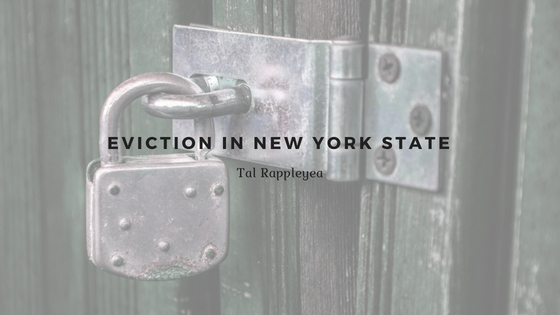Unfortunately, there will be situations that arise, where eviction of a roommate or individual is necessary. There are very specific restrictions and laws set in place that individuals need to be aware of. Eviction laws and regulations vary from state to state, so this blog will focus specifically on eviction that takes place in New York.
Eviction Defined
An official eviction is a legal process in which a landlord or property owner works to have an individual removed from a home or apartment. An eviction process must also take place in situations where an individual has been living in a hotel or rooming house for more than 30 days. There is a timeline of events that must take place within a Summary Proceeding (for an eviction case).
The most important step is the serving of papers. There are two different types of papers that must be served, and in most (almost all) cases, the landlord cannot be the one to serve the papers. Anyone that is over 18 years of age can serve the papers, and it is possible for a landlord to hire a Process Server to serve the required documents. There are the papers that must be served:
- The Notice of Petition – This is document that will supplement the petition itself. It provides the respondent with basic info on the actual petition and tells the respondent that the official legal process has started.
- The Petition – The petition itself will contain the reason that the landlord wants to have the tenant removed from the property.
As a general note, the tenant in question must be served at minimum 5 days before the court date.
Criminal Violations of Eviction Laws
Tenants have rights in these proceedings. Landlords are not allowed to evict any parties without winning an eviction case and getting a court ordered Warrant of Eviction. Some landlord may try to force tenants to vacate the premises via illegal eviction practices. It is illegal for a landlord to evict a tenant by changing locks, removing property from a residence, or turning off water and/or electricity.
Any of the above mentioned acts (or any behaviour that would keep a tenant out of their apartment), is a direct violation of the Real Property Law Section 235.
What Are Valid Reasons for Eviction?
There are a several different reasons for why a tenant may be evicted. The most common reason for eviction is non-payment (rent is owed). A landlord may also look to evict a tenant of the terms of the lease are violated or the lease is over.
In the case of a month-to-month arrangement (without a lease), a tenant can be evicted if they were given a month’s notice to vacate the premises.
What Must A Landlord Bring to Eviction Court?
A tenant will not be legally evicted if the landlord does not provide proof. The landlord need to be prepared with lease documentations, all rent-related documents (proof of payment & non-payment), any written agreements from tenant,& deeds to the property.
For more information, please see the resources for this blog: NYCCourts.gov, Landlord Guidance, & LawNy.org
